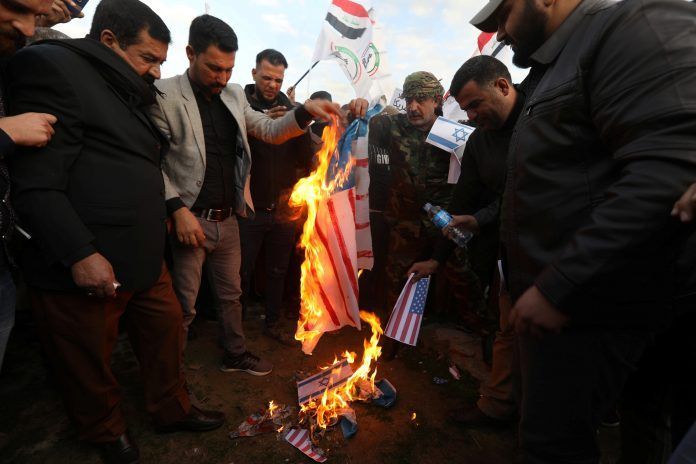
By Idrees Ali
WASHINGTON, Dec 30 (Reuters) – U.S. military officials said they are closely watching for reprisals for American air strikes in Iraq and Syria against an Iran-backed militia group, with the potential for a cycle of retaliatory actions that could inflame tensions between Washington and Tehran.
The U.S. military carried out the strikes on Sunday against the Kataib Hezbollah militia group in response to the killing of a U.S. civilian contractor in a rocket attack on an Iraqi military base.
On Monday, a top Iraq militia leader warned of a strong response against U.S. forces in Iraq following the air strikes that killed at least 25 people.
U.S. military officials, speaking to Reuters on the condition of anonymity, said they had little doubt the militia group would respond in some way which could lead to a new spike in tensions between the United States and longtime foe Iran.
“I think that they will retaliate,” one military official said, referring to Kataib Hezbollah.
[aesop_image img=”https://kayhanlife.com/wp-content/uploads/2019/12/2019-12-30T101109Z_908963718_RC2M5E9J2JSM_RTRMADP_3_IRAQ-SECURITY-USA.jpg” panorama=”off” credit=”Destroyed headquarters of Kataib Hezbollah militia group are seen after in an air strike in Qaim, Iraq, December 30, 2019. REUTERS./” align=”center” lightbox=”off” captionsrc=”custom” captionposition=”left” revealfx=”off” overlay_revealfx=”off”]
Another military official said that there was concern that the events over the past week could lead to a cycle of retaliation.
Iraqi security sources said that U.S. forces in Iraq’s northerly Nineveh province were ramping up security overnight, with U.S.-led coalition jets circling the perimeter of its military bases in Mosul and Qayarah.
In a briefing with reporters on Monday, U.S. officials said Washington had exhibited restraint and patience in the face of escalating provocations from Iran or Iranian-backed groups amid tightening sanctions on Tehran, but that it was time to re-establish deterrence against Iranian aggression.
The United States and Iran went to the brink of direct conflict after attacks on oil tankers this summer and the shooting down of a U.S. unmanned drone. Washington has blamed Iran, which denied being behind the attacks on the tankers.
“The past few days have provided a case study of how a cycle of escalation could start,” Thomas Warrick, a senior fellow with the Atlantic Council, said.
The Pentagon on Sunday warned that Iran and Kataib Hezbollah “must cease their attacks on U.S. and coalition forces” to prevent additional “defensive actions” by U.S. forces.
The officials said that for now U.S. forces were waiting to see what exactly the militia groups and Iran would do.
“The reason the Pentagon should be concerned is because cross-domain escalation is the name of the game with Iran,” Behnam Ben Taleblu, a fellow at the Foundation for Defense of Democracies think-tank, said.
(Reporting by Idrees Ali, additional reporting by Doina Chiacu; Editing by Mary Milliken and Alistair Bell)

